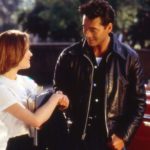In the midst of World War II, the Pacific campaign of 1942, the Japanese are fleeing Guadalcanal, and the American Marines who survived the battles are trying to recover in Sydney bars. The sergeant nicknamed Rebel, performed by Matt Dillon, clearly identified the object of his desire in the person of Katie MacLeod (pop star Debbie Byrne), the main soloist of the girl group, who contributes to the victory by entertaining soldiers on vacation. This is the plot of the 1985 Australian film Rebel directed by Michael Jenkins, based on the play “No Names No Pack Drill” by Bob Herbert, who also acted as a screenwriter.
Rebel’s persistence pays off, and although Katie is married, she is captivated by the humanity, sensitivity and high cheekbones of a young guy: he is a deserter with post-traumatic syndrome, AWOL, determined never to fight or kill again, but ready to punch anyone in the jaw to prove his point. The military police are looking for a guy to put him on trial, our hero doesn’t want to get caught by them at all – the American “Smersh” first prefer to beat their victim to a pulp.
Slippery businessman Tiger (Brian Brown) can arrange Rebel’s escape from Australia on a cargo ship, but he, having met love, hesitates in his decision. Well, with the development of the plot, it becomes more difficult for Katie to hide the connection with the American, and after all, both moralists and the police will not pat her on the curly head.
Debbie Byrne – We’ll Live The Rest Of Our Lives Tonight
The highlight of the film is the impressive musical scenes and the powerful ballad “Heroes” performed by Debbie Byrne. Ray Barrett as the artistic director of mom’s amateur performance of a nightclub entertainer. The opening number, stylized as the swing of the 40s with a touch of disco performed by girls desperately parodying the Andrews sisters, sets a bright dazzling atmosphere. If the film had been shot as a full-fledged musical, it would probably have been much more successful, because its main advantages are the original songs by Peter Best and choreography by Ross Coleman, even if they do not look like what could be heard and seen in the 1940s.
On the other hand, the film is rather clumsy in dramatic aspects: almost every serious scene ends abruptly with a return to action – with one or the other of the unhappy lovers. If the drama is not always convincing, then the comic book-style quasi-musical about the Second World War still has enough quality to stand the test of time. This is a production in the style of the 40s, but in the spirit of the 80s, with a screaming red and bright pink neon light. Matt Dillon appears in his most skillful and romantic image, and Debbie Byrne is also good, there is also a fan service, and few professional actresses could cope with such requirements for the ability to sing and dance, which were imposed on her role.
Debbie Byrne – Nothing As Lethal As Love
In 1985, Rebel received five awards from the Australian Film Institute (AFI): for Best Cinematography (Peter James), for Best Production Designer (Brian Thomson), for Best Costume Designer (Roger Kirk), for Best Sound Engineer and for Best Soundtrack.


Download or listen online songs from OST Rebel 1985 (mp3, 23 MB) (only 4 songs from the soundtrack could be found)
In this film there are references to Orpheus (1949), a French film by Jean Cocteau: military patrol officers on motorcycles appear and disappear, constantly chasing someone. This is something sinister present throughout the movie. There is an undoubted influence of “Cabaret” by Bob Fosse, as well as “One from the Heart” by F. F. Coppola. In imitation of the latter, the filmmakers were reproached by Dillon’s agent, who wanted more unambiguous and impeccable courageous roles for his ward.
Matt Dillon, here after the Outsiders, and brilliantly copes with the role of a Marine “not himself”, desperately in need of love and comfort … but still remaining a sexually aggressive man and smart enough to use his appearance to seduce a girl.
In this film, he has not yet grown up as an actor, as in his later works like The Big Town. Nevertheless, he conveys a lot about the atmosphere of the time when desertion was punishable by hanging.
Creating his play in the 1970s, Herbert turned to military Sydney in the summer of 1942 to tell a story based in part on real events in Kings Cross involving his sister and an American soldier. The play explores the concepts of loyalty, love and honor against the backdrop of wartime.
In the original, the romantic drama begins with the fact that Marine Harry “Rebel” Porter, who is in a semi-conscious state, is awakened from a dream by a young postman Katie. She spends most of the play trying to get rid of the unwanted guest, secretly hoping that he will linger.
On the stage, the male lead in this play in 1979 was played by a young actor Mel Gibson. And in the script for the film, the girl turned from a postal worker into a cabaret singer, the star of the musical Grease Olivia Newton-John was first supposed to play this role, but Debra Byrne passed the casting and for her Katie turned out to be the only main role in her movie career.
***
With a clear anti-war stance, “Rebel” deserves attention against the backdrop of the current onslaught of war films. At a minimum, the “Rebel” is a rare exhibit in Australian cinema and cinema of the 80s in general. For all its many undoubted flaws, there is something strangely appealing about its clunky, hyper-realistic recreation of military Sydney, as well as something touching about its almost shameful sentimentality.
Download or watch online movie Rebel (1985) (mkv, 909 MB)




































